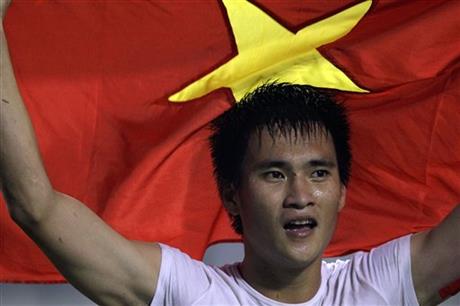
By JOHN DUERDEN
FILE – In this Dec. 28, 2008 file photo, Vietnam’s Le Cong Vinh celebrates winning the final match of the ASEAN Football Federation Suzuki Cup against Thailand at My Dinh Stadium in Hanoi, Vietnam. Le, who has been one of the biggest stars in Vietnam and Southeast Asia for a number of years, joined a J-League team, Consadole Sapporo. The J-League insists it is committed to developing football in Southeast Asia for the long-term and at a number of levels. (AP Photo/Chitose Suzuki, File)
SEOUL, South Korea (AP) — The English Premier League has long drawn the most attention among soccer fans in Southeast Asia. Its newest rival for regional audiences comes not from the top leagues in Spain or Italy, but from Japan.
The J-League, established in 1993 and generally regarded as Asia’s best domestic competition, does not have the history or the prestige of the big European leagues. But while English clubs like Manchester United and Liverpool might play an exhibition match in Bangkok or Kuala Lumpur every couple of years, the J-League insists it is committed to developing soccer in Southeast Asia for the long term and at a number of levels.
Over the past two years, the J-League has signed separate partnership agreements with leagues in Thailand, Vietnam, Cambodia, Singapore and Myanmar, which involve the exchange of expertise on and off the field.
Japanese clubs have established relationships with teams in the region. Thailand, Vietnam and Myanmar started broadcasting J-League games in 2012 and more countries are expected to follow.
“We fully understand how popular the English Premier League is in Southeast Asia,” Daisuke Nakanishi, the J-League director of competitions and sales management, told The Associated Press. “That’s why we think that there is no way of winning if we apply the same approach in the market, and we believe that we should do something different.”
Nakanishi says Japan’s league has two advantages over the European leagues.
“We are in Asia, so we are close to the region geographically and mentally, and Japan is the only country which used to be very weak, but has grown rapidly in very short period,” he said. “So we can be a role model. We are more than happy to share our knowhow with Southeast Asia in order to develop together.”
The size and global reach of the top English clubs mean that any partnerships they form in Southeast Asia are unequal. In the past, local clubs have sometimes been reduced to little more than merchandise peddlers for the big teams.
On the pitch it can be a similar story. In 2007, three of Thailand’s top players famously joined Manchester City, then owned by the country’s former Prime Minister Thaksin Shinawatra, yet none made it close to a Premier League appearance and soon departed. The J-League is good, but not to the extent that it is a closed door for Southeast Asian talent.
“In the near future, we hope that there will be many star Southeast Asian players playing in the J-League, which makes the J-League more visible and popular in the region,” Nakanishi said. “This is a unique approach which the English Premier League does not have.”
Worawi Makudi, president of the Thailand Football Association, agrees that Japan has much to offer as a role model for developing soccer nations in Asia.
“At the moment in the region, the English Premier League is popular and is tough to beat, but maybe the Japanese league in terms of broadcasting rights can grow,” Worawi said. “If Japanese clubs have Thai players then people in Thailand would like to watch them.”
There are plans to make it easier for the best Thai stars to head east. Much could depend on the success of Le Cong Vinh, who has been one of the biggest stars in Vietnam and the region for a number of years.
The striker had a short but unsuccessful spell with Portuguese club Leixoes in 2009 and last month joined Consadole Sapporo, which was relegated last season to Japan’s second tier. Ngo Le Bang, general secretary of the Vietnamese Football Federation has high hopes for Vinh.
“Le Cong Vinh is one of our best players,” Bang said. “Firstly his appearance in Japan, even in the second division, could promote the image of Vietnamese football, and then after him there could be other opportunities.”
Bang says the experience the country’s players could receive in Japan will benefit the Vietnamese national team and professional league.
“The reputation of the J-League is improving partly due to the increasing number of players from Japan heading to the top leagues of Europe. Their football players have made huge progress in domestic and international competitions. … Japan shows how a team can compete equally against physically stronger teams.”
The Vietnamese striker does not see himself as a figurehead for the new relationship between Southeast Asia and Japan. He just wants to play.
“I think the J-League is the best league in Asia and I believe that I can learn a lot of things here,” he said. “That’s why I decided to come here. … I am ready to show my strengths to the fans.”
It won’t be just fans in Vietnam who will be watching with interest to see if Le is able to do so.



